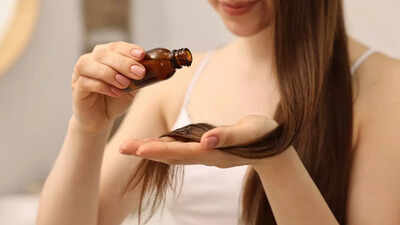Health
Balance Hair Oil Usage to Avoid Damage and Maintain Shine

Natural oils such as coconut, argan, and almond are popular in hair care routines for promoting healthy, shiny hair. While these oils provide essential nourishment and protection against environmental damage, excessive application can lead to adverse effects. Over-oiling can result in greasy, weighed-down hair and various scalp issues, including dandruff and irritation. Understanding how to correctly apply these oils while balancing them with proper cleansing is crucial for maintaining optimal hair health.
The Role of Natural Oils in Hair Care
Hair and scalp naturally produce oils, known as sebum, which act as a protective barrier for hair strands. This natural oil keeps hair hydrated, soft, and shiny while shielding it from daily stressors such as sun exposure and pollution. Many people supplement this natural protection with external oils. When used in moderation, these oils can enhance hair texture, reduce frizz, and strengthen the hair shaft. However, a study published in PubMed Central, a service of the National Institutes of Health, highlights that excessive oil use can pose risks, including hindering hair growth and leading to scalp conditions.
Over-oiling occurs when the scalp and hair accumulate more oil than necessary. This can result from applying too much oil, using heavy products, or infrequent washing. While applying oils once or twice a week can be beneficial, daily heavy application may lead to build-up, affecting both hair appearance and health.
Consequences of Excessive Hair Oil
One of the most evident signs of over-oiling is hair that appears limp and greasy. When hair absorbs too much oil, it loses its natural bounce and volume, becoming difficult to style. Heavy oils, such as castor or coconut oil, can weigh the hair down, leading to a flat appearance. This can impact self-esteem as individuals may feel embarrassed by greasy locks, prompting them to wash their hair more frequently. Ironically, excessive washing can disrupt the scalp’s natural oil balance, leading to increased oil production and worsening the issue.
Another significant concern associated with over-oiling is the risk of clogged hair follicles. When oil accumulates on the scalp, it can mix with dead skin cells and environmental debris, forming a layer that obstructs the follicles. This blockage can hinder hair growth and lead to thinning or hair loss. Many incorrectly attribute thinning hair solely to genetics, overlooking the impact of improper oil application or insufficient cleansing.
Excess oil on the scalp also creates an inviting environment for bacteria and fungi, which can trigger common scalp conditions like dandruff and seborrheic dermatitis. Symptoms may include itching, redness, and irritation, which can become chronic if left untreated. Maintaining a balanced oil level is essential for scalp health.
Strategies for Effective Hair Care
To prevent the negative effects of over-oiling, establishing a balanced hair care routine is vital. Utilizing lightweight oils or leave-in treatments can provide nourishment without leaving excessive residue. It’s essential to choose products tailored to your hair type—whether fine, thick, curly, or straight.
Regular scalp exfoliation can help remove excess oil and product build-up. Clarifying shampoos, scalp scrubs, or natural treatments, such as oatmeal or clay masks, can effectively cleanse the scalp. Exfoliation also stimulates blood circulation, promoting healthier hair growth.
Washing hair with a mild, clarifying shampoo can remove trapped oil while preserving the hair’s natural protection. Following this with a conditioner or hair mask can restore hydration and softness. The frequency of washing should be adapted based on hair type, lifestyle, and scalp needs to prevent excessive oiliness or dryness.
While natural oils are essential for maintaining healthy hair, moderation is crucial. Over-oiling can lead to clogged follicles, greasy hair, and scalp issues. By applying oils judiciously, incorporating a gentle cleansing routine, and paying attention to your scalp’s needs, you can enjoy the benefits of hair oils without encountering the associated risks. Achieving the perfect balance will allow you to maintain vibrant, strong, and healthy hair throughout the year.
-

 World5 months ago
World5 months agoSBI Announces QIP Floor Price at ₹811.05 Per Share
-

 Lifestyle5 months ago
Lifestyle5 months agoCept Unveils ₹3.1 Crore Urban Mobility Plan for Sustainable Growth
-

 Science4 months ago
Science4 months agoNew Blood Group Discovered in South Indian Woman at Rotary Centre
-

 World5 months ago
World5 months agoTorrential Rains Cause Flash Flooding in New York and New Jersey
-

 Top Stories5 months ago
Top Stories5 months agoKonkani Cultural Organisation to Host Pearl Jubilee in Abu Dhabi
-

 Sports4 months ago
Sports4 months agoBroad Advocates for Bowling Change Ahead of Final Test Against India
-

 Science5 months ago
Science5 months agoNothing Headphone 1 Review: A Bold Contender in Audio Design
-

 Top Stories5 months ago
Top Stories5 months agoAir India Crash Investigation Highlights Boeing Fuel Switch Concerns
-

 Business5 months ago
Business5 months agoIndian Stock Market Rebounds: Sensex and Nifty Rise After Four-Day Decline
-

 Sports4 months ago
Sports4 months agoCristian Totti Retires at 19: Pressure of Fame Takes Toll
-

 Politics5 months ago
Politics5 months agoAbandoned Doberman Finds New Home After Journey to Prague
-

 Top Stories5 months ago
Top Stories5 months agoPatna Bank Manager Abhishek Varun Found Dead in Well









